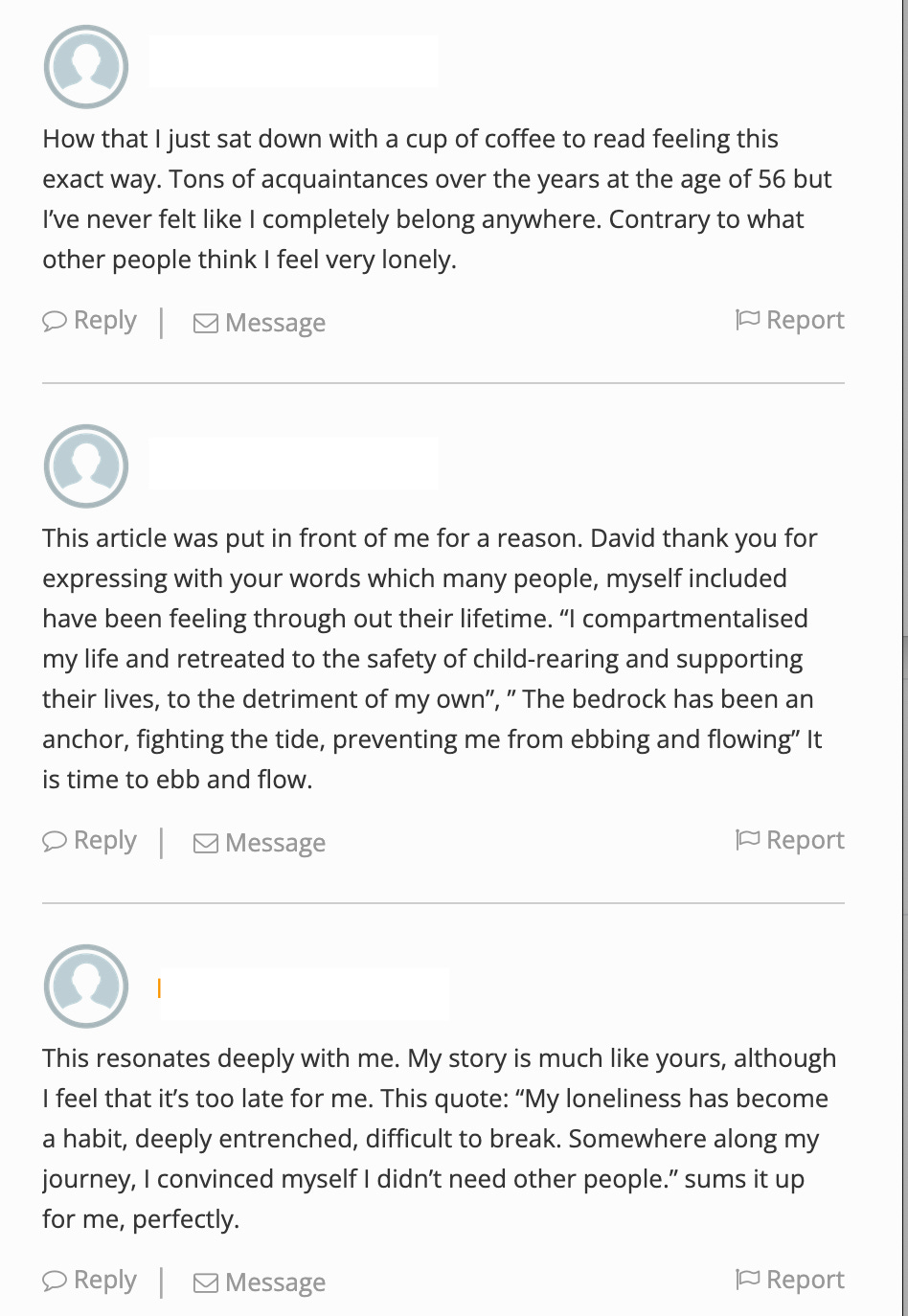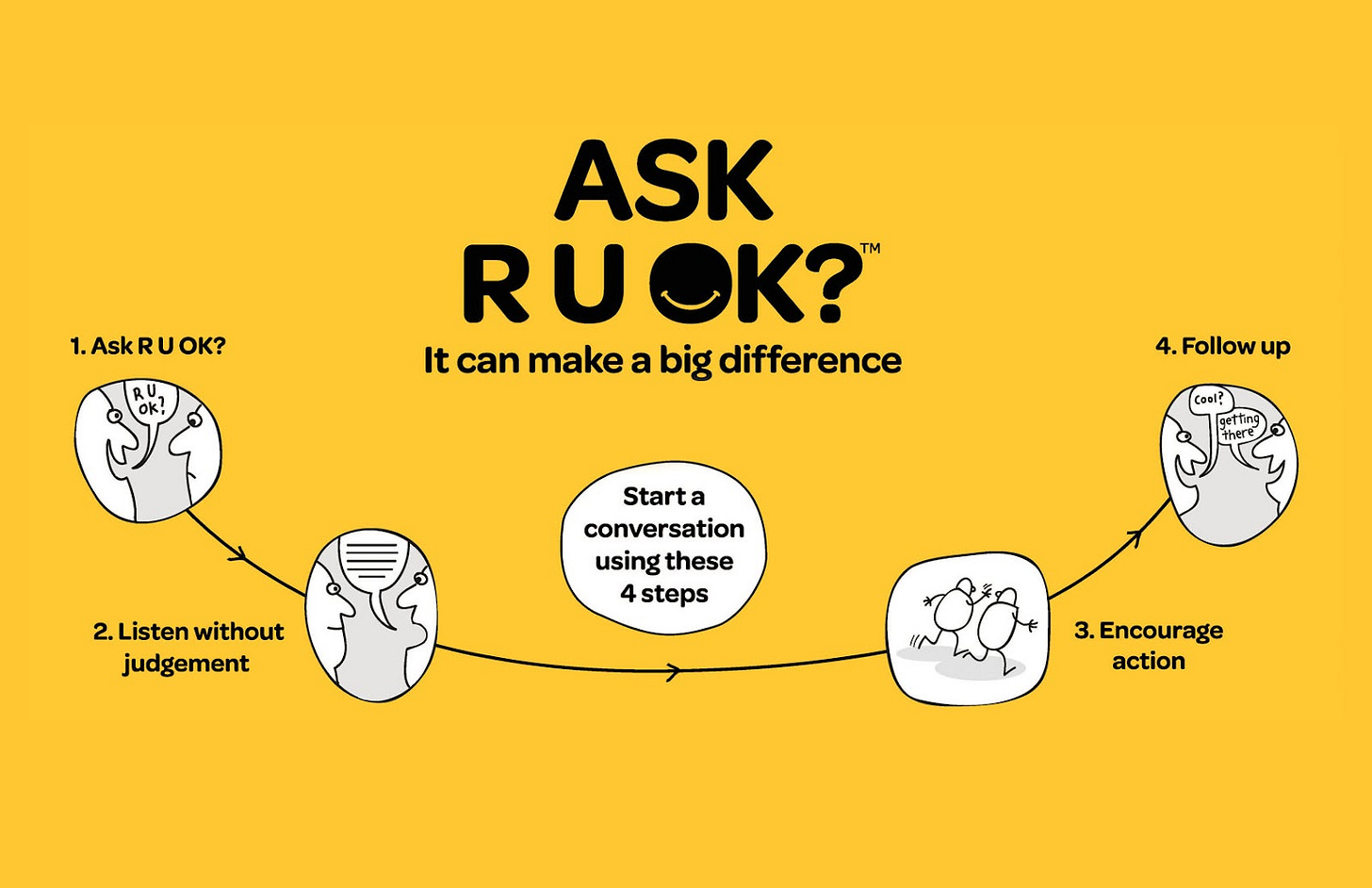What Happens When You Actually Talk About Loneliness?
When we stop treating loneliness as a personal failing and start treating it as useful information about our need for connection, everything changes.
There's something particularly absurd about loneliness in our hyperconnected age. We've got more ways to reach each other than ever before, yet here we are, scrolling through perfectly curated feeds while sitting alone with a bowl of two-minute noodles, wondering why everyone else seems to have figured out this whole connection thing.
I've been thinking about this a lot lately, especially after writing about the myth of self-sufficiency and our tendency toward performative living. We've become masters at performing connection while feeling more isolated than ever. We post photos of social gatherings, craft witty responses in group chats, and maintain the facade that we're thriving in our independence, all while privately wondering if anyone would notice if we just disappeared for a week.
But what happens when we stop performing and start talking about loneliness? Not the sanitised, Instagram-friendly version where we post quotes about "enjoying our own company," but the absolute truth about feeling disconnected in a connected world? The results can be surprisingly transformative.
I've written before about living truthfully in a performative world, and nowhere is this more evident than in how we handle loneliness. We've collectively agreed to treat it like some personal failing, evidence that we're not interesting enough, charming enough, or socially adept enough to maintain the kind of rich social lives we see across social media.
For those of us navigating life solo, whether by choice or circumstance, this performance becomes even more complex. We can't rely on the built-in intimacy of long-term partnerships or the natural social scaffolding that comes with raising children. Instead, we're expected to curate and maintain our entire social ecosystem while pretending it all comes naturally.
I know this intimately because I lived it for years. After graduating from university and navigating multiple relationships, I had amassed hundreds of professional connections, yet I lacked a single genuine friend. I'd mastered the art of networking, small talk, and being the charming acquaintance at parties, but I was lost when it came to a real connection.
The stigma around loneliness is particularly brutal when you're living independently. Society has taught us that choosing to be alone should equal contentment with solitude, and that feeling lonely means we've somehow failed at the independence we've supposedly chosen.
This performance trap is especially complex for people across different identities. LGBTQIA+ individuals might face additional layers of isolation if they're navigating family rejection or living in less accepting communities. People with disabilities often encounter loneliness compounded by accessibility barriers and societal assumptions. Cultural backgrounds also influence how loneliness is experienced, with some communities viewing it as reflecting family or community failure.
When Silence Becomes a Health Crisis
Vivek Murthy, the US Surgeon General who declared loneliness a public health epidemic in his 2023 advisory "Our Epidemic of Loneliness and Isolation," found that:
"Loneliness and weak social connections are associated with a reduction in lifespan similar to that caused by smoking 15 cigarettes a day."
When we refuse to discuss something this significant, we're essentially agreeing to suffer in silence while our well-being deteriorates.
I reckon the energy required to maintain this performance of perpetual social satisfaction could power a small city. We become so focused on looking connected that we miss opportunities for actually being connected. This place of ‘giving the impression of everything is ok, yet it wasn’t’ is where I found myself.
Five years ago, I wrote an article that was published on Elephant. “I’m 54 Years Old and Been Lonely My Whole Life” was the first time I had ever written the words, ‘I am lonely’.
“I’m 54 years old, and recently I realised I’ve been lonely my whole life. Somewhere along the line, I didn’t make any friends.
I have no ongoing friendships from school or university nor any of the myriads of activities a parent participates in through their children.”
I received dozens of comments, most of which expressed that I had hit a nerve and that my words resonated.
This article became the first on my new Substack after I had a revelation: writing is a tool for self-understanding. I had also started my therapy journey, which included weekly discussions about recognising and understanding emotions.
Finally, I acknowledged publicly the elephant in the room.
The Art of Honest Conversation
Research by Brené Brown, as detailed in her book "Daring Greatly: How the Courage to Be Vulnerable Transforms the Way We Live, Love, Parent, and Lead", has shown that vulnerability is the birthplace of connection, not its enemy. "Vulnerability is not weakness," she argues. "It's our measure of courage." When we're willing to be vulnerable about our loneliness, we invite others into an authentic relationship rather than surface-level interaction.
The act of naming loneliness also helps us understand it better. Often, what we call "loneliness" is a complex mix of emotions: grief over lost connections, anxiety about social situations, disappointment in superficial relationships, or simply a deep hunger for being truly seen and known. When we start talking about these feelings, we can begin to address their root causes rather than just managing the symptoms.
For those of us living solo, this honesty becomes even more crucial. We don't have the luxury of a built-in intimate relationship to process these feelings with. We need to create spaces for emotional honesty actively, and that starts with being willing to name what we're experiencing.
Writer and activist bell hooks, in her book "All About Love: New Visions," offers her insight:
"But many of us seek community solely to escape the fear of being alone. Knowing how to be solitary is central to the art of loving. When we can be alone, we can be with others without using them as a means of escape."
This reminds us that talking about loneliness isn't about rejecting solitude, but about distinguishing between chosen solitude and unwanted isolation. I wrote about this recently, including the great quote from Sherry Turkle, "Loneliness is failed solitude."
“You can be surrounded by people at a party and feel profoundly alone, or spend a weekend by yourself and feel perfectly content. Loneliness occurs when there's a mismatch between the social connections we have and the connections we crave.”
Talking about loneliness isn't as simple as announcing "I'm lonely!" at inappropriate moments. Like any meaningful conversation, it requires some thoughtfulness about timing, audience, and approach, skills I've had to learn the hard way over the years of social fumbling.
Start small and specific rather than making grand proclamations about your social life. "I've been feeling a bit disconnected lately", invites conversation in a way that "I'm desperately lonely and my life is falling apart" might send people dashing for the exits! The former acknowledges a common human experience; the latter feels like a crisis requiring professional intervention.
Choose your audience wisely, at least initially. Look for people who've demonstrated emotional intelligence in other situations. These might be friends who've been vulnerable with you before, family members who listen when you talk, or even online communities dedicated to authentic discussion.
Timing matters enormously. Look for natural openings: moments when conversations turn more personal, when someone else shares something vulnerable, or when you're in a setting that encourages deeper discussion.
Be prepared for various responses. Some people will meet your honesty with their own; others might not know how to respond and will quickly change the subject. Don't take it personally, and don't let one awkward response stop you from being honest with others.
Frame loneliness as part of the human experience rather than a personal failing. Maya Angelou, in her autobiography "I Know Why the Caged Bird Sings," wrote,
"There is no greater agony than bearing an untold story inside you."
Loneliness is part of many people's stories, and sharing it can be tremendously healing, both for you and for the person listening.
Consider different platforms for these conversations. Face-to-face discussions work well for some, while others might find it easier to start online or through written communication.
Remember that talking about loneliness doesn't mean dwelling on it or making it your entire identity. The goal is to bring it into the light so it loses some of its power over you. It's about creating space for authenticity in a world that rewards performance.
Building Community Through Vulnerability
Someone who has made a point of talking to people is Will Shears, who goes by the Instagram handle @a_mug_of_life. He asks Londoners if they'd like a cup of tea (such an English stereotype, I know!) and a chat to combat loneliness. Will is a documentary filmmaker who started the "A Mug of Life" project to connect with people and combat loneliness. It’s a perfectly delightful idea, and the videos are genuine and lovely. Apparently, he’s turned down often, but for those who agree, the videos are genuine and lovely.
Will has shown that for people from diverse backgrounds, these conversations might need different approaches, and so might yours. Someone navigating cultural expectations around independence might need to discuss loneliness differently within their family versus with friends. People with disabilities may need to consider how accessibility affects their social connections. LGBTQIA+ individuals might find different levels of safety in various communities.
I've seen this firsthand as I've become more honest about my struggles with connection. The conversations that emerged from my vulnerability led to unexpected friendships, deeper relationships with existing acquaintances, and a sense of belonging I hadn't experienced since childhood. They led to a network of people who understand that our community requires ongoing attention and care.
These communities don't always look like what we might expect. Sometimes they're loose networks of people who check in on each other occasionally. Sometimes they're more structured groups that meet regularly around shared interests. They might be online forums where people share resources, or impromptu gatherings that emerge when someone admits they're struggling.
The key characteristic of these communities is that they're built on authenticity rather than performance. Members don't have to pretend to be constantly happy. They can share the real ups and downs of life, including the times when connection feels elusive.
This kind of community is particularly valuable for people living independently. We need spaces where we can acknowledge the challenges of solo living without being told we should find a partner or join more clubs. We need people who understand that sometimes loneliness isn't about lacking social options, it's about lacking genuine connection.
As therapist Esther Perel observes,
"The quality of your life ultimately depends on the quality of your relationships."
When we stop treating loneliness as a shameful secret and start treating it as a normal human experience, we create space for relationships that actually sustain us.
The practical benefits are significant. Members often share resources, from therapy recommendations to invitations to low-key social activities. They provide accountability for self-care and social connection goals. They offer reality checks when loneliness distorts thinking or isolation feels unchangeable.
These communities demonstrate that loneliness doesn't have to be permanent. By witnessing others move through periods of isolation and back into connection, members develop hope and practical strategies. They also identify systemic issues that contribute to isolation.
The communities that form around honest conversations about loneliness often become some of the meaningful relationships in people's lives. They teach us that real strength isn't about how much you can carry alone, but about knowing when to share the load. They show us that vulnerability is actually the foundation of genuine connection.
There are initiatives around loneliness that seek to empower us all to have those honest conversations, like RU OK Day in Australia.
R U OK? is an Australian national suicide prevention charity and registered public health promotion that encourages people to stay connected and have conversations that can help others through difficult times. This year, RU OK Day is Thursday, 11 September, and there is a concerted media and promotional effort for all Australians to check in with friends and family, and ask, “Are you ok?”.
Their website offers a wealth of material to support the effort, including tools to ask the question. To create a conversation.
“Got a feeling that someone you know or care about isn’t behaving as they normally would? Perhaps they seem out of sorts? More agitated or withdrawn? Or they’re just not themselves. Trust that gut instinct and act on it. “
Learning to talk about loneliness has become an ongoing practice for me, much like building authentic connections or challenging myths of self-sufficiency I've written about before. It's not a problem to be solved once and for all, but a skill to be developed over time.
The more I've practised honesty about my own experiences of disconnection, the more I've realised that loneliness isn't the opposite of independence; it's often the price we pay for performing independence instead of living it authentically. True independence includes knowing when we need others and having the courage to reach out.
When we stop treating loneliness as a personal failing and start treating it as helpful information about our need for connection, everything changes. We move from isolation to community, from performance to authenticity, from the exhausting work of appearing fine to the more rewarding job of being real.
The next time you're feeling lonely, and there will be a next time, consider what might happen if you dropped the performance for just one conversation. Instead of scrolling through those perfectly curated feeds while eating your two-minute noodles, what if you texted someone and said, 'I'm having one of those disconnected evenings'?
You might discover that the energy you've been spending on appearing fine could be better invested in actually being fine. After all, we're all just making it up as we go along anyway - we might as well do it together






